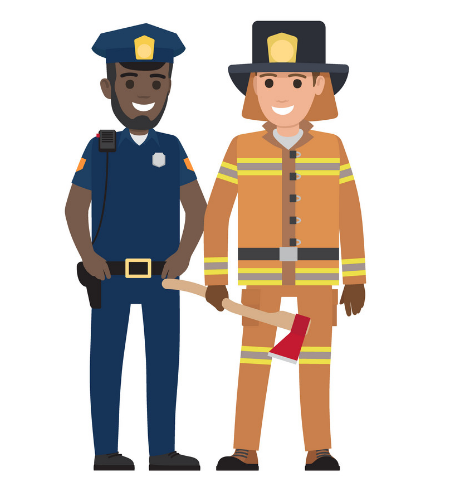
- admin
- October 27, 2020
- 7:34 pm
- No Comments
5 Expectations People Have From A Civil Servant
The life of a civil servant is spent serving the public. Professionals in civil service roles are expected to work toward the betterment and protection of the people. Every government job needs passionate, educated, and trustworthy individuals who citizens can go to without a second thought.
Over two million civil servants are currently working tirelessly in various government positions to provide a better present and future to American citizens. They are usually employed in their local communities or a state office.
Your salary and benefits may differ from other civil service jobs depending on your chosen career, but the goal remains the same: to protect and serve. With similar goals come similar expectations. Here are all the responsibilities you are expected to fulfil as a civil servant.
Approachable
When you take an oath to help the public, you have to be readily available. Of course, no one walks around with a ‘Do not disturb’ board to scare off citizens, but even your demeanor says a lot about your approachability!
Everyone has their own biases when assessing individuals in public. Many citizens may feel more comfortable walking up to someone who looks more like them, thus making them more approachable. However, studies show that a kinder demeanor can make you look less intimidating and more likely to be approached. Your body language can also influence how people look at you. It’s no secret that more than the spoken word, we rely on visual communication. So, as a civil servant, you have to continually work on presenting yourself to be kinder to the public.
Professional
There’s a fine line between friendliness and unprofessionalism, and as a government employee, you have to master it. While you want to be kind and approachable to individuals, you also want to know that you work to maintain discipline and order.
 The problem with being too friendly is that many people may start to take advantage of it. So, you have to strike the perfect balance to be taken seriously, all while trying to be relatable and kind to anyone who might approach you.
The problem with being too friendly is that many people may start to take advantage of it. So, you have to strike the perfect balance to be taken seriously, all while trying to be relatable and kind to anyone who might approach you.
However, it’s not just people who can make you look unprofessional; even a hectic job schedule can do that. Unprofessionalism owing to burnout is very real. Especially if you work in a government position such as a police officer or a firefighter, there must always be an active effort from you to be professional on the job because losing that could make your work ten times harder.
Non-Discriminatory
As a government employee, you’re expected to help citizens from all backgrounds. No matter their age, sex, ethnicity, race, or immigration status, it’s crucial that you treat them all the same. It doesn’t just stop at ethnic background or age; a government employee also can’t treat anyone with a disability any differently. Title VII protects these civilian rights in the Civil Rights Act of 1964.
And while there are laws set in place to ensure no discrimination occurs, there are still ways for your implicit bias to push you toward, say, racial profiling. So, it’s crucial as a government employee to challenge your racial prejudice and encourage the same among your colleagues. When the public sees every citizen being treated justly by government employees, they’ll be more willing to cooperate and help out within their communities.
Culturally Sensitive
You might view the U.S. as one big nation, but research shows that there are ‘nation divides’ even within the U.S., owing to our diverse culture and history. Being a government employee in such a diverse country means you’ll have to deal with people from different cultural backgrounds. And there is only one way to engage with them, and that is with an open mind.
Throughout your career, you’re bound to come across cultural conflicts—or even converse with citizens whose culture makes no sense to you. However, it’s essential to understand that everyone comes from a different background and deserves the same respect.
If you’re stationed at a precinct with a particular ethnic majority, it will help to educate yourself on the local norms and customs. This way, when dealing with conflict, you will not have to worry about not having context.
It will also help you not misinterpret different forms of communication. As a civil servant, you are expected to do the extra homework not included in your job description to ensure a conflict-free resolution.
Integrity
It’s not enough to vow to protect the public; you also have to refuse any form of corruption that could hinder your promise to the people. A civil servant’s integrity is their most prideful trait, and they are expected never to taint it with bribes or corrupt practices.
 Not only is it frowned upon, but corruption is also criminalized. The Travel Act also criminalizes any form of bribery offered to U.S. government officials or civil servants. It is taken very seriously, and any malpractice could ruin your career. It would also harm the trust placed on civil servants. To ensure this never happens, both the government and its employees ensure that such offenders are prosecuted.
Not only is it frowned upon, but corruption is also criminalized. The Travel Act also criminalizes any form of bribery offered to U.S. government officials or civil servants. It is taken very seriously, and any malpractice could ruin your career. It would also harm the trust placed on civil servants. To ensure this never happens, both the government and its employees ensure that such offenders are prosecuted.
If you wish to serve your country’s people with the same trust and honesty, you should apply to become a civil servant. However, the first step to becoming a government employee is to attempt the civil services exam.
Currently, the Suffolk County Police Test and NYC Sanitation Worker Exam dates are drawing close. You can contact us, at Civil Service Success, to sign up for preparatory classes. Our classes are taught by industry professionals who ensure that our students get all the preparation they need to score high marks in the civil services examination. We also guide first-time test takers.
Register with us today and embark on your journey to becoming a civil servant.

